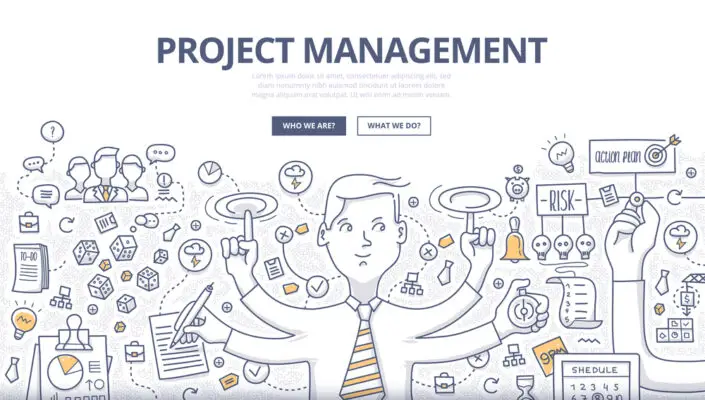Project Management Coordinators play a crucial role in ensuring the successful execution of projects within an organization. They coordinate and oversee various project activities, including planning, scheduling, budgeting, and resource allocation.
They work closely with project managers and team members to meet project goals within the allocated time frame and budget.
Project Management Coordinators are also responsible for monitoring project progress, identifying potential risks and issues, and implementing appropriate mitigation strategies.
They also assist in preparing project documentation, such as reports, presentations, and status updates, to keep stakeholders informed about project progress and outcomes.
Strong organizational, communication, and analytical skills are essential for individuals in this role to manage multiple projects and stakeholders effectively.
In this piece, we will provide you with an overview of the roles and responsibilities of project management coordinators and the necessary education, training, and skills required to succeed in this field.
Whether you’re an aspiring project management coordinator or an employer looking to hire one, this article will be a valuable resource to help you navigate the world of project management coordination.
Overview of Project Management Coordinator Jobs
Project management coordinator jobs involve overseeing and coordinating various projects, ensuring they are completed on time and within budget.
These professionals manage project schedules, track progress, and communicate with team members and stakeholders.
They play a crucial role in ensuring the successful execution of projects and require strong organizational, communication, and problem-solving skills.

Qualifications and Requirements
Applicants for project management coordinator positions must possess a strong background in project management methodologies and demonstrate proficiency in utilizing project management software.
Project management coordinator jobs require individuals to have excellent time management skills and the ability to coordinate tasks within a project management team effectively.
In addition to project coordination experience, candidates should also have a degree in business or a related field. The role of a project management coordinator involves working closely with project managers to ensure that projects are delivered on time and within budget.
Responsibilities may include assisting with project planning, monitoring progress, and coordinating resources.
Strong communication skills are essential for effectively liaising with stakeholders and resolving any project-related issues that may arise.
A successful project management coordinator must possess technical expertise, organizational skills, and a strong understanding of project management principles.
Education and Training for Project Management Coordinators
To excel as a Project Management Coordinator, individuals must possess the necessary education and training.
This can be achieved through various means, such as school diploma programs, certificate programs, and online courses.
These educational opportunities provide the foundational knowledge and skills to coordinate and manage projects effectively.
School Diploma Programs
School diploma programs provide individuals with the necessary knowledge and skills to excel in project management coordinator jobs. These programs offer a comprehensive curriculum that covers key areas such as project planning, budgeting, resource management, and communication.
Students learn how to effectively coordinate and oversee projects from start to finish, ensuring they are completed within budget and on time.
Additionally, school diploma programs often include practical training opportunities, allowing students to apply their newly acquired skills in real-world scenarios.
This hands-on experience is invaluable in preparing individuals for the challenges they may face in project management coordinator roles.
Graduates of these programs are equipped with the expertise and credentials needed to pursue a successful career in project management coordination. This makes them highly sought after by employers in various industries.
Certificate Programs
Certificate programs offer individuals a focused and specialized education in a specific field, providing them with the necessary skills and knowledge to excel in their chosen profession.
For aspiring project management coordinators, certificate programs can be a valuable stepping stone toward a rewarding career.
These programs offer comprehensive training in project management principles, methodologies, and tools, equipping individuals to effectively plan, execute, and control projects.
The demand for project management coordinators is rising, with organizations recognizing the importance of skilled professionals in managing complex projects.
Online Courses
Online courses provide individuals with the flexibility and convenience to enhance their skills and expand their knowledge in various subjects from the comfort of their homes.
This is especially beneficial for those seeking project management coordinator jobs, as it allows them to acquire the necessary skills and credentials at their own pace.
Here are three ways online courses can benefit aspiring project management coordinators:
- Specialized Skills: Online courses offer various project management-related topics, such as risk management, communication, and leadership. These courses provide in-depth knowledge and practical skills essential for success in project management coordinator roles.
- Professional Certifications: Many online courses offer the opportunity to earn industry-recognized certifications, such as the Project Management Professional (PMP) certification. These certifications not only enhance a candidate’s resume but also demonstrate their commitment to excellence in project management.
- Networking Opportunities: Online courses often provide access to online forums and communities where students can connect with other professionals in the field.
- This networking can be invaluable for aspiring project management coordinators, leading to job opportunities, mentorship, and collaboration on future projects.
Job Roles and Responsibilities of Project Management Coordinator
The job role of a Project Management Coordinator involves a range of responsibilities that contribute to the successful execution of projects.
They are responsible for handling administrative tasks, assisting with project plans, budgets, and schedules, and ensuring comprehensive documentation of projects.
Additionally, they provide regular status reports to the project manager or team leader and collaborate with external clients or stakeholders to ensure project success.
Administrative Tasks
As a project management coordinator, a significant aspect of your role involves handling various administrative tasks. These tasks ensure smooth project operations and support project managers and the project team.
Here are three key administrative tasks that project coordinators often handle:
- Document Management: Project coordinators are responsible for maintaining and organizing project documentation, including project plans, status reports, meeting minutes, and stakeholder communication. They use project management tools to track and update project documents, ensuring easy access and retrieval when needed.
- Scheduling and Coordination: Project coordinators schedule meetings, coordinate team members’ calendars, and arrange logistics for events and activities. They facilitate communication among team members, ensuring everyone is aware of their responsibilities and deadlines.
- Budget Monitoring: Project coordinators assist in managing project budgets by tracking expenses, monitoring financial reports, and assisting in budget forecasting. They collaborate with project managers and the administrative project coordinator to ensure that spending aligns with the approved budget.
Administrative tasks are essential for project success, and project coordinators are vital in ensuring efficient execution.
Assisting with Project Plans, Budgets and Schedules
Understanding project plans, budgets, and schedules is crucial for effectively supporting operations. As a project management coordinator, one of your main responsibilities is to assist with the development and maintenance of project plans, budgets, and schedules.
This involves working closely with project managers and team members to ensure that all aspects of the project are properly planned and executed within the allocated resources and timeframe.
To give you a better idea of the tasks involved, here is a breakdown of the specific areas where a project management coordinator plays a key role:
| Assisting with Project Plans | Assisting with Budgets | Assisting with Schedules |
|---|---|---|
| – Defining project objectives and deliverables | – Estimating project costs and resources | – Creating project timelines and milestones |
| – Identifying project stakeholders and their roles | – Tracking project expenses and ensuring budget compliance | – Monitoring project progress and identifying potential delays |
| – Developing project work breakdown structures and task lists | – Analyzing budget variances and proposing adjustments | – Coordinating with team members to ensure timely task completion |
| – Documenting project risks and mitigation strategies | – Supporting the procurement process for project materials and services | – Facilitating communication and coordination among project stakeholders |
Comprehensive Documentation of Projects
Comprehensive documentation of projects is essential for ensuring transparency, accountability, and effective communication among all stakeholders involved.
Project coordinators play a crucial role in managing project documentation to ensure the smooth execution of projects.
Here are three reasons why comprehensive project documentation is important in project coordinator jobs:
- Project Status: Detailed documentation allows project coordinators to track and report on the progress of projects. It provides a clear overview of project milestones, deliverables, and timelines, enabling effective monitoring and control.
- Stakeholder Management: Documentation helps project coordinators effectively communicate project updates and changes to all stakeholders. It ensures that everyone involved is informed about project goals, requirements, and progress, fostering collaboration and alignment.
- Project Planning and Execution: Comprehensive documentation is a reference point for project planning and execution. It enables project coordinators to create detailed project schedules, allocate resources, and identify potential risks and mitigation strategies.
- Project management software can further streamline documentation, enhancing project coordination and organizational skills.
Status Reports to the Project Manager or Team Leader
Effective status reports are essential for keeping the project manager or team leader informed about the progress and current state of the project.
As a project management coordinator, it is crucial to provide regular updates to ensure that everyone involved is on the same page and any issues can be addressed promptly.
Status reports are a communication tool that allows the project manager or team leader to make informed decisions and take necessary actions.
To give you a visual representation of how status reports can be structured, here is a simple table:
| Project Area | Current Status |
|---|---|
| Scope | On track |
| Schedule | Delayed |
| Budget | Within limits |
In this example, the project is on track in terms of scope but experiencing delays in the schedule. The budget, however, remains within limits.
This snapshot provides a quick overview of the project’s current state and enables the project manager or team leader to address any concerns or allocate resources accordingly.
Working with External Clients or Stakeholders
Working collaboratively with external clients or stakeholders requires effective communication and a thorough understanding of their needs and expectations.
As a project management coordinator, it is essential to establish a strong working relationship with these individuals or organizations to ensure the project’s success.
Here are three key aspects to consider when working with external clients and stakeholders:
- Clear and Transparent Communication: Regularly update clients and stakeholders on project progress, milestones, and any issues that may arise. This helps to build trust and maintain open lines of communication throughout the project.
- Active Listening and Understanding: Take the time to actively listen to clients and stakeholders, understanding their requirements, concerns, and expectations. This will enable you to tailor project plans to meet their needs, ensuring their satisfaction.
- Conflict Resolution: In any project, conflicts may arise. As a project management coordinator, it is your responsibility to address these conflicts promptly and find amicable solutions that satisfy all parties involved. Effective conflict resolution skills are crucial in maintaining positive relationships with clients and stakeholders.
Skills Necessary to be a Successful Project Management Coordinator
To be a successful project management coordinator, one must possess strong communication skills and organizational ability.
Effective communication enables the coordinator to clearly convey project goals, expectations, and updates to team members and stakeholders.
Additionally, organizational ability is crucial for managing project timelines, resources, and documentation efficiently.

Communication Skills
Strong communication skills are essential for project management coordinators to collaborate effectively with team members and stakeholders.
In project management coordinator jobs, communication is key in ensuring project success. Here are three important aspects of communication skills for project coordinators:
- Clear and concise communication: Project coordinators must convey information accurately and succinctly to internal teams and stakeholders. This includes presenting project updates, discussing goals and objectives, and promptly addressing issues or concerns.
- Active listening: Effective project coordinators listen attentively to understand the needs and requirements of the project. By actively listening to team members and stakeholders, they can gather valuable insights and make informed decisions to drive project success.
- Written communication skills: Project coordinators often need to document project plans, progress reports, and other important information. Strong written communication skills are necessary to ensure project documentation’s clarity, accuracy, and consistency.
Organizational Ability
Effective organizational ability is vital for project coordinators to efficiently manage tasks, resources, and timelines. They must be able to effectively allocate resources, such as budget, equipment, and personnel, to ensure the successful completion of the project.
Additionally, project coordinators must possess strong time management skills to ensure tasks are completed within the designated timeframe. This requires prioritizing tasks, creating schedules, and monitoring progress.
A high organizational ability also allows project coordinators to manage contracts and service agreements effectively, ensuring that all parties involved meet their obligations.
A degree in project management can provide individuals with the necessary knowledge and skills to excel in this role. Project coordinators are often employed in office settings, working closely with project managers and other team members to ensure the successful execution of projects.
Effective organizational ability is crucial for project coordinators to manage resources, tasks, and timelines successfully and ultimately contribute to the successful completion of projects.
Frequently Asked Questions
What Is the Average Salary Range for a Project Management Coordinator?
The average salary range for a project management coordinator can vary depending on factors such as experience, location, and industry. However, it typically falls between [insert salary range] per year.
What Are the Career Growth Opportunities for a Project Management Coordinator?
Career growth opportunities for a Project Management Coordinator include advancing to higher-level project management roles, becoming a project manager or program manager, or transitioning into a leadership position within the organization.
Are There Any Professional Certifications That Can Enhance the Career Prospects of a Project Management Coordinator?
Several professional certifications can enhance the career prospects of a project management coordinator, such as the Project Management Professional (PMP) certification and the Certified Associate in Project Management (CAPM) certification. These certifications showcase expertise and can lead to better job opportunities and salary potential.
What Are the Typical Working Hours for a Project Management Coordinator?
The typical working hours for a project management coordinator can vary depending on the organization and project demands.
However, it is common for coordinators to work full-time hours, typically Monday to Friday, with occasional overtime or weekend work required.
How Does the Role of a Project Management Coordinator Differ From That of a Project Manager?
The role of a project management coordinator differs from that of a project manager in terms of their responsibilities. While a project manager oversees the entire project, a coordinator focuses on specific tasks and supports the project manager in executing the project successfully.

Conclusion
Project management coordinators play a crucial role in ensuring the successful execution of projects. They are responsible for coordinating various aspects of a project, such as scheduling, resource allocation, and communication.
To excel in this role, individuals must possess strong organizational and communication skills and a solid understanding of project management principles.
Project management coordinators can contribute to successfully completing projects in various industries with proper education and training.

Chris Ekai is a Risk Management expert with over 10 years of experience in the field. He has a Master’s(MSc) degree in Risk Management from University of Portsmouth and is a CPA and Finance professional. He currently works as a Content Manager at Risk Publishing, writing about Enterprise Risk Management, Business Continuity Management and Project Management.


